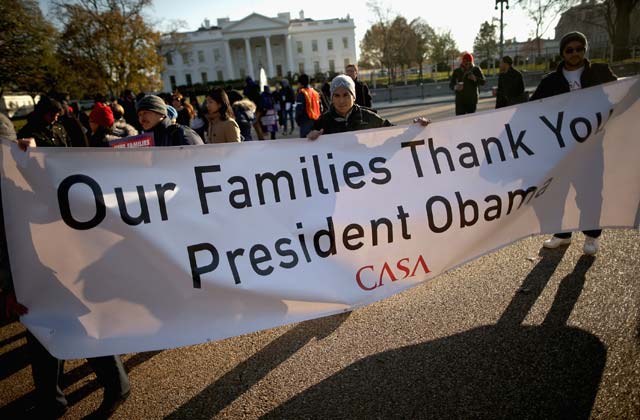The controversial Secure Communities (S-Comm) program is coming to an end under Obama’s executive action on immigration. A new program called the Priority Enforcement Program, or PEP-Comm for short, will take its place. But will it be much better?
In his announcement Thursday, and then nearly verbatim in Las Vegas Friday, Obama stressed new targets for the Department of Homeland Security (DHS): "Felons, not families. Criminals, not children. Gang members, not a mom who’s working hard to provide for her kids," the president said. "We’ll prioritize, just like law enforcement does every day."
Those dichotomies raise concerns for some. "I was thinking about how certain communities are over-policed à la Ferguson," says Angela Chan, policy director and senior staff attorney at the Asian Law Caucus. "This juxtaposition forgets the reality that some communities are over-policed and over-criminalized."
Like PEP-Com, its predecessor created a path to deportation. The program–which began in 2008 under George W. Bush and escalated under by Obama–required local jails and prisons to hand over the fingerprints of anyone being processed to Immigration and Customs Enforcement (ICE), including people who hadn’t yet had their day in court. If ICE deemed the person a threat it would issue them a so-called detainer, a 48-hour hold in a local jail or prison. Although detainers were supposed to last up to two days, many were extended by weeks or months at a time. And although S-Comm was created to catch undocumented immigrants, it often swept up U.S. citizens, even those who hadn’t been convicted of a crime. Some local agencies and entire states refused to cooperate with S-Comm because the detainers weren’t warrants issued by a judge. Rather, they were the result of decisions made by a federal agency plagued with problems.
The National Day Laborer Organizing Network (NDLON) led the charge to end S-Comm and explicitly demanded its end in the days leading up to the president’s announcement. In some ways, it seems like NDLON has won.
In a November 14 memo [PDF], Homeland Security Secretary Jeh Johnson conceded that the program essentially failed:
The Secure Communities program, as we know it, will be discontinued.
The goal of Secure Communities was to more effectively identify and facilitate the removal of criminal aliens in the custody of state and local law enforcement agencies. But the reality is the program has attracted a great deal of criticism, is widely misunderstood, and is embroiled in litigation; its very name has become a symbol for general hostility toward the enforcement of our immigration laws. Governors, mayors, and state and local law enforcement officials around the country have increasingly refused to cooperate with the program, and many have issued executive orders or signed laws prohibiting such cooperation. A number of federal courts have rejected the authority of state and local law enforcement agencies to detain immigrants pursuant to federal detainers issued under the current Secure Communities program.
Under the president’s new program, most people who haven’t been convicted of crimes won’t be issued a detainer–although undocumented immigrants who are suspected of terrorism may be targeted. In addition, PEP-Comm will ensnare people found crossing the border, gang members, those convicted of felonies, people who’ve been convicted of three misdemeanors, and those who have one "significant misdemeanor" on their record. Significant misdemeanors include domestic violence, burglary and drug-selling. Instead of issuing a detainer, Johnson’s memo instructs local and state agencies to notify ICE that the person is question will soon be released.
But the Asian Law Caucus’ Chan finds what she calls alarming similarities between S-Comm and PEP-Comm–particularly when it comes to local and state agencies doing the work of what should be federal enforcement. "The bones of the program are the same. Under S-Comm, fingerprints are transmitted to Immigration and Customs Enforcement by local police. Under PEP-Comm, the same thing will happen."
Chan adds that any entanglement with local law enforcement is a threat to public safety because it invites police to select people for deportation instead of protecting their welfare.
Time will also tell whether agents honor the directives of Johnson’s PEP-Comm memo.
